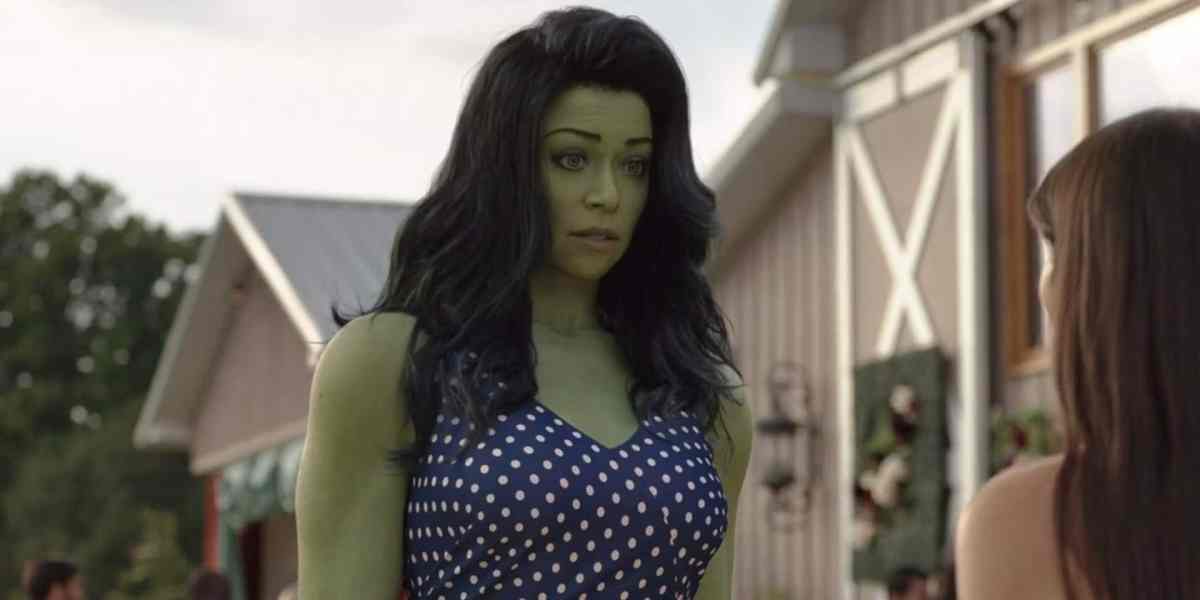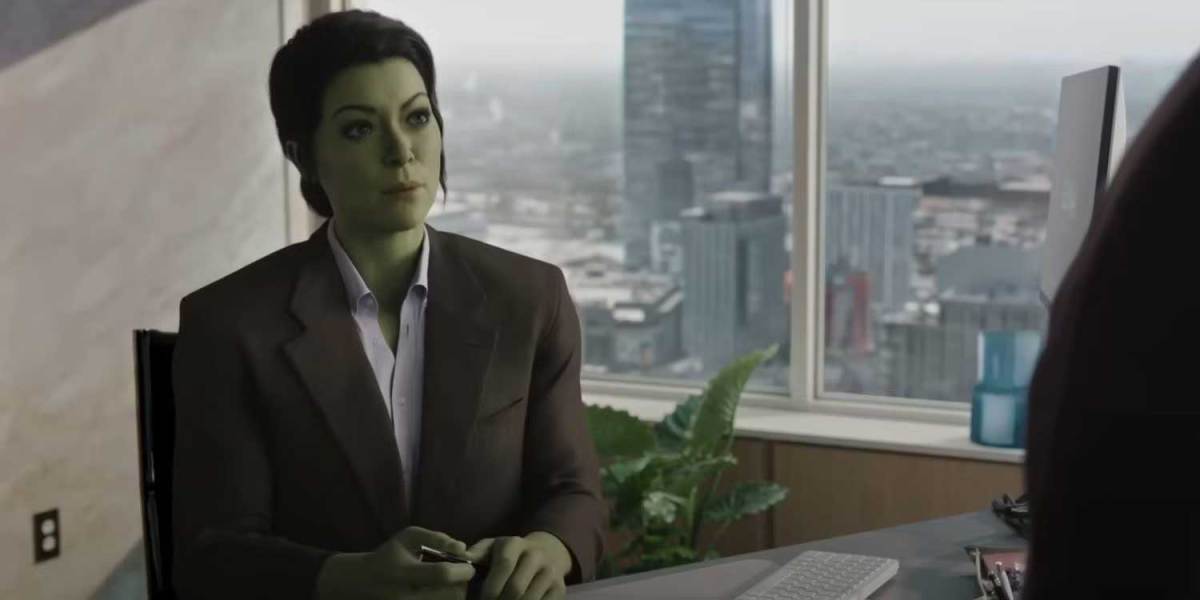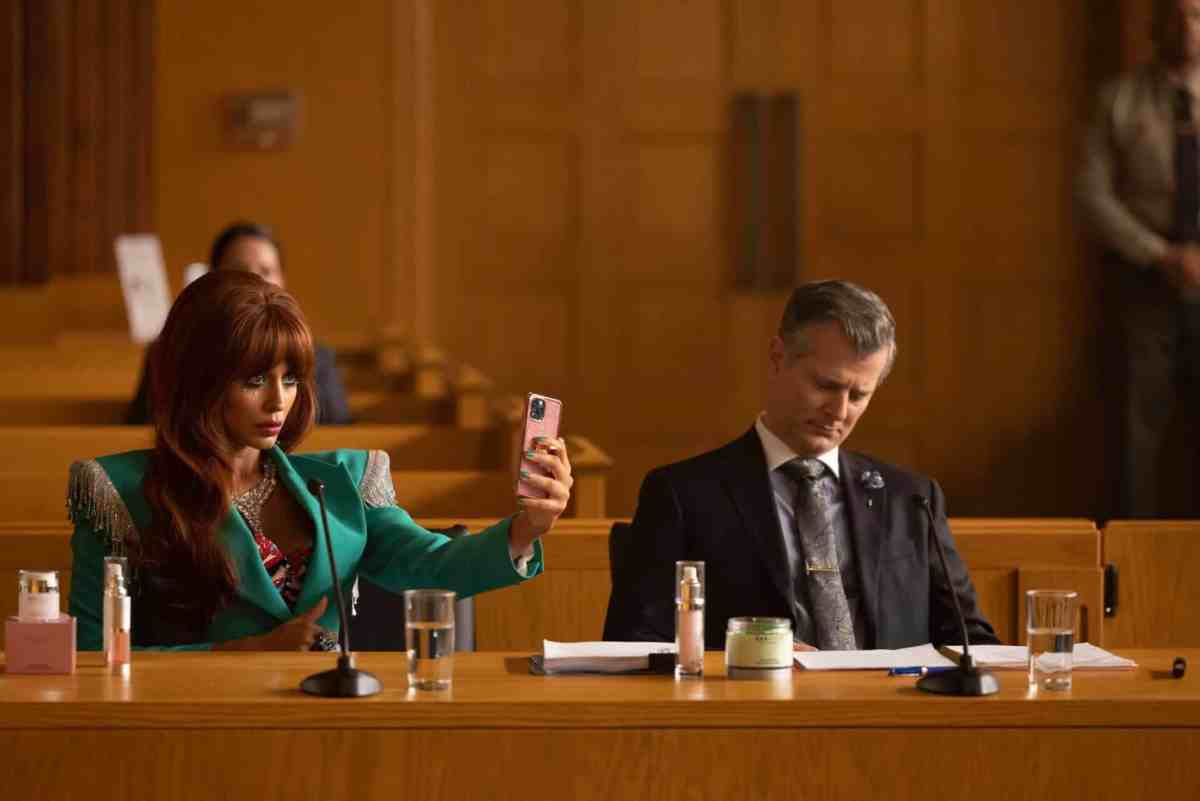This discussion and review contains spoilers for She-Hulk episode 6, “Just Jen.”
There is something to be said for “Just Jen” as an episode of She-Hulk that lets the show be its own thing. After all, the bulk of She-Hulk to this point has been dominated by crossovers and cameos to a much greater degree than any of the other live-action Marvel shows.
Bruce Banner (Mark Ruffalo) appeared in “A Normal Amount of Rage” and “Superhuman Law.” The Abomination (Tim Roth) appeared in “Superhuman Law” and “The People vs. Emil Blonsky.” Wong (Benedict Wong) appeared in “The People vs. Emil Blonsky” and “Is This Not Real Magic?” Even “Mean, Green, and Straight Poured into These Jeans” ended with another tease of the inevitable appearance of Daredevil (Matt Murdock).
In many of these cases, She-Hulk didn’t just lean into cameos; it doubled down on them. This is particularly frustrating given that the show would repeatedly insist that Jen Walters (Tatiana Maslany) was its narrative focal point. Jen complained about having to interrupt her “fun lawyer show” for a paint-by-numbers superhero origin story in “A Normal Amount of Rage.” In “The People vs. Emil Blonsky,” she warned the audience, “Just remember whose show this actually is.”
At various points over the course of the run, it seems like the show itself was at risk of forgetting. This is what makes “Just Jen” so interesting. It is the first episode of She-Hulk that actually feels like a fully self-contained episode of She-Hulk, which Jen herself acknowledges to the camera. “Yes, it’s a self-contained wedding episode,” she tells the audience. “And if you think this is happening at an inconvenient time in the season, you’re right. ‘Cause that’s how weddings always are.”
There’s a weird antagonism between She-Hulk and its audience, and it often feels rooted in that tug-of-war over “whose show this actually is.” Jen (and the writers) seems to assume that all the audience wants is a cynical cavalcade of cameos. She referred to Wong as “Twitter armor” at the start of “Is This Not Real Magic?” It’s telling that Daredevil is both the show’s big cameo that has been teased in pre-release trailers and something that the show is consciously withholding well into the season.

As such, it’s nice that “Just Jen” is essentially exactly what it says on the tin. It doesn’t rely on any outside cameos or references to hold the audience’s attention, outside of a quick phone call to Bruce’s voicemail. It is perhaps a problem that “Just Jen” arrives six episodes into a nine-episode run, at what’s effectively the juncture between the second and third acts of the season, but it’s still a welcome and overdue attempt to demonstrate that She-Hulk can stand on its own two feet.
There is a lot to like here, in theory. Tatiana Maslany is a strong performer, and She-Hulk hasn’t used her to her full abilities. Spending an entire episode with Maslany, without crowding her out with references to other properties, is a good thing. Similarly, even though she is being set up as the season’s big bad, Titania (Jameela Jamil) hasn’t really had much opportunity to interact with Jennifer outside a courtroom, so throwing them together at a social function is a good idea.
However, “Just Jen” runs into a number of larger problems with She-Hulk as a whole. Most obviously, it feels like a sitcom episode from a writing staff that hasn’t quite figured out how to write a sitcom episode. Head writer Jessica Gao has talked about how her plans to structure the season around a single trial ran aground when the writing staff realized none of them were “that adept at writing, you know, rousing trial scenes.” It seems like situational comedy offers a similar learning curve.
Episodes like “The People vs. Emil Blonsky” and “Is This Not Real Magic?” found the show figuring out the basic language of sitcom structuring, with two plots unfolding in parallel. However “Just Jen” demonstrates more fundamental issues within that. The essence of these basic storylines is that characters should be confronted with a challenge and then overcome that challenge through the course of the story. It’s the format that Seinfeld mocked with its “no hugging, no learning” rule.

“Just Jen” sets up two central conflicts that need resolution in each of the plot threads. In the primary plot thread, Jen attends the wedding of her old friend Lulu (Patti Harrison). Jen wants to attend in her She-Hulk persona, but Lulu is worried about being upstaged at her ceremony. In the second plot thread, Nikki Ramos (Ginger Gonzaga) finds herself working with Mallory Book (Renée Elise Goldsberry), with the temp desperate to impress the cold and distant lawyer.
Those are fairly straightforward conflicts that need to be resolved within the episode. “Just Jen” understands this. The episode ends with Lulu enthusiastically embracing Jen-as-She-Hulk, the two old friends reconciling, and Lulu accepting Jen’s inner self. Simultaneously, Nikki manages to crack Mallory’s cold exterior, the two women bonding and opening up to one another. Mallory lets herself be vulnerable to Nikki, revealing that she is married and that she has at least one child.
This is a fairly solid template for an episode. The problem is that “Just Jen” absolutely fails to deliver any of the connective tissue to move these plot threads from their initial setup to their conclusion. The actual character work happens entirely off-screen. There is no moment where the relationships between the characters in the story actually change. Instead, the change appears to happen in the negative space between cuts, the audience shown that the relationship has changed.
This is most obvious in the plot built around Nikki and Mallory. There are some early hints of tension between Nikki and Mallory, even if the conflict between the two could be more clearly established. “Just Jen” doesn’t really do a lot to establish that Mallory thinks Nikki is unprofessional and that Nikki thinks Mallory is too arch. However, the episode is clearly building to a scene where Nikki can prove herself to Mallory, demonstrating that she is capable and efficient in her own way.

There is a reasonable amount of setup here. Dealing with a complicated divorce case involving Mr. Immortal (David Pasquesi), Mallory initially proposes an even distribution of her client’s assets, a choice that leads to immediate chaos. Nikki has to step into the gap, using her lateral thinking and interpersonal skills to offer tailor-made compensation to each of the wives in a way that demonstrates her deeper understanding of human nature — a warmth that Mallory lacks.
The problem, again, is that this moment happens entirely between scenes. “Just Jen” cuts away from the meeting room erupting into discord, and then it cuts back to Nikki sitting on the table, having already solved the problem. There’s no tension and there’s no satisfying payoff. The audience is told that there is a problem and then that the problem is solved. It’s bad storytelling. Star Trek: Lower Decks recently did a much better version of this plot with Tendi (Noël Wells) in “Mining the Mind’s Minds.”
Something similar happens in the primary plot. Jen arrives at Lulu’s wedding in her She-Hulk form. Lulu complains that Jen is overshadowing her on her wedding day, and so Jen changes back into her human form. The episode works hard to make Lulu unsympathetic and to present Jen as the victim, subject to humiliations like being paired with a dog and having to iron the groomsmen’s shirts. However, provoked by Titania, Jen does eventually transform into She-Hulk and cause a scene.
At the end of the episode, Lulu literally and figuratively embraces She-Hulk. Jen gets to be accepted as her superhero persona, and the party goes on around her. However, like Nikki’s big moment in the Mr. Immortal subplot, this character moment happens entirely off-screen. What prompts Lulu’s change of heart, other than the fact that the episode is almost over? What epiphany does she have? After all, it’s not like She-Hulk saves Lulu from Titania or anything like that.

There is a sense in which She-Hulk is demonstrating what happens when the narrative limitations of the Marvel Cinematic Universe brush up against the demands of sitcom plotting. Marvel Studios is notoriously conflict-averse, to the point that Captain America: Civil War ends with Steve Rogers (Chris Evans) sending Tony Stark (Robert Downey Jr.) a note and a cell phone that amounts to a “no hard feelings” resolution that completely undermines any sense of actual conflict between the two.
Similarly, since around Avengers: Age of Ultron, Marvel Studios has been actively hostile to the idea that its characters might need to change or grow. Characters in movies like Age of Ultron and Spider-Man: Homecoming don’t learn from their mistakes; they just repeat the same mistakes until they work because the movie has entered its third act. Marvel Studios is reluctant to acknowledge its characters can be wrong, which is necessary for them to change in ways these stories require.
There is also the issue of the unchecked and uncritical power fantasy, which has been a fixture of the shared universe since at least Civil War. There is a palpable reluctance to have these characters show humility or accept that others matter. Here, Jen shows up at a friend’s wedding and immediately makes it about how cool it is that she is a superhero. “I just wanted to come to one wedding and show that I was actually doing pretty good,” she confesses. “I just wanted to be amazing tonight.”
That is a really unhealthy way to approach a friend’s wedding. That should be their day. A more interesting version of this plot would have Jen learn that Lulu’s day is more important than her cool superhero life, and that would be the point of reconciliation. Instead, “Just Jen” goes out of its way to present Lulu as a monster and a punchline, and so it leaves the episode incapable of figuring out a satisfying resolution to its primary plot thread.
It’s good that “Just Jen” is an episode that feels like She-Hulk is finally taking some time to focus on itself. There is a lot of work that could be done towards self-improvement.
